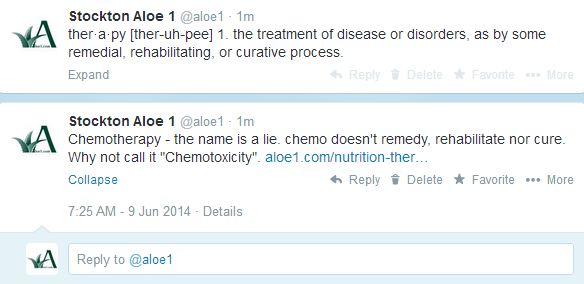
Chemotherapy is Chemotoxicity
It is interesting how we choose words based on their sellability. For example, “health care” is really “sick care.” Nobody wants to buy sick care, so they call it health care. You don’t go to the doctor when you are healthy, but when you are sick. If you go when you are healthy, chances are, your health care plan won’t pay for your health care services.
In the same way, getting people to buy chemotoxicity when they have cancer would not be an easy sell. It is much easier to get them to buy therapy than toxicity; so someone decided to call it chemotherapy. A therapy is the remediation of a health care problem; that is, to correct something that is not right. In the case of cancer, the immune system is not working sufficiently. Chemotherapy is not intended to correct the immune system. We can reasonably conclude that chemotherapy is technically not a therapy.
 Chemotherapy is a process of adding toxicity to the body with the hopes of cancer cells dying in the toxic environment and with an even greater hope of normal body cells surviving the chemical attack. It is based on the fact that cancer cells are fast multiplying and poorly defined. That is, they are less differentiated than normal cells and are more likely to suffer the consequences of a chemical attack. Make no mistake about it, chemotherapy is not good for you. It is not intended to be good for you. Chemotherapy is intended to be deadly. If you give chemotherapy to a healthy person, it will harm them. A healthy person getting “therapeutic” doses of chemotherapy will achieve less health and be more likely to get cancer. It would be foolish to take chemotherapy in attempt to prevent cancer. Chemotherapy is bad for you. From now on, I will call chemotherapy what it really is … chemotoxicity.
Chemotherapy is a process of adding toxicity to the body with the hopes of cancer cells dying in the toxic environment and with an even greater hope of normal body cells surviving the chemical attack. It is based on the fact that cancer cells are fast multiplying and poorly defined. That is, they are less differentiated than normal cells and are more likely to suffer the consequences of a chemical attack. Make no mistake about it, chemotherapy is not good for you. It is not intended to be good for you. Chemotherapy is intended to be deadly. If you give chemotherapy to a healthy person, it will harm them. A healthy person getting “therapeutic” doses of chemotherapy will achieve less health and be more likely to get cancer. It would be foolish to take chemotherapy in attempt to prevent cancer. Chemotherapy is bad for you. From now on, I will call chemotherapy what it really is … chemotoxicity.
Nutrition Therapy
True cancer “therapy” would attempt to correct the problem or the cause of cancer. It would attempt to boost the immune system and provide the immune system with what it needs to thrive and do the work it was intended to do. It would not focus on the cancer but rather on the health of the person.
Nutrition therapy should be recommended to all cancer patients. Although it can accompany chemotoxicity, the best results may actually be achieved using nutrition therapy without the toxic attack. Nutrition therapy would consist of superfoods that are known to strengthen the immune system. This might include superfoods like Aloe vera gel, barley grass juice, dark berry juices, cruciferous vegetables, phytonutrient formulas, spices, and herbal extracts known to work against cancers. Superfoods tend to have high nutrition content yet few calories which allows for large quantities of the nutrients. Nutrition therapy must be broad spectrum and target specific at the same time. That is, a variety of nutrient-dense superfoods should be used making certain to include large amounts of the specific nutrients known to be effective in patients with certain kinds of cancer. The majority of the nutrition therapy nutrients should come from things natural rather than from synthetic supplements and vitamins.
Once the patient is determined to be cancer free, they should continue to mantain a diet high in superfoods for the rest of their life. You do not have to have cancer to enjoy the benefits of superfoods. Healthy patients can also consume aloe vera gel, barley grass juice, dark berry juices, cruciferous vegetables, phytonutrient formulas, spices, and herbal extracts. The key is to diversify the diet and regularly include a variety of those things mentioned. Unlike chemotoxicity, nutrition therapy is good for a healthy person. It can help them achieve greater health. Giving nutrient-dense superfoods to a healthy person will not make them sick but will instead help them prevent disease.
Share your thoughts in the comments below.